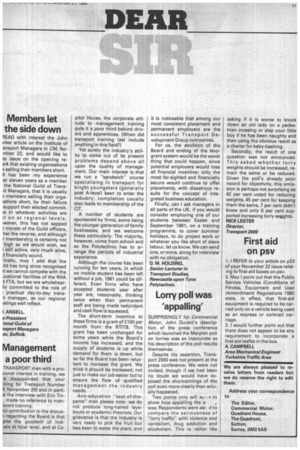Management a poor third
Page 13

If you've noticed an error in this article please click here to report it so we can fix it.
TRANSPORT men with a pro3ional interest in training, we -e disappointed that your ining for Transport Number 4, November 29) and in partiar the interview with Eric Tin, made no reference to manment training.
iur contribution to the discus1 regarding the Board is that pite the goodwill of indiJals at local level, and at Ca pitol House, the corporate attitude to management training puts it a poor third behind drivers and apprentices. (When did transport training last include anything in this field?) Yet surely the industry's ability to come out of its present problems depend above all upon the quality of management. Our main interest is that we run a "sandwich" course specialising in transport for bright youngsters (generally post A-level) keen to enter the industry; completion usually also leads to membership of the CIT.
A number of students are sponsored by firms, some being the younger generation of family businesses, and we welcome these particularly. The majority, however, come from school and so the Polytechnic has to arrange the periods of industrial experience.
Although the course has been running for ten years, in which no mobile student has been left without a job, 1981 could be different. Even firms who have accepted students year after year are, reasonably, thinking twice when their permanent staff are being made redundant and cash flow is squeezed.
The short-term incentive to these firms is a grant of £100 per month from the RTITB. This grant has been unchanged for some years while the Board's income has increased, and the supply of students is up while demand for them is down, but so far the Board has been reluctant to increase the grant. We think it should be increased, not just to make our job easier but to ensure the flow of qualified management the industry needs.
Anti-education "seat-of-thepants" men please note: we do not produce long-haired layabouts or academic theorists. Our grievance is that the industry is very ready to pick the fruit but less keen to water the plant, and it is noticeable that among our most consistent placement and permanent employers are the successful Transport Development Group companies.
For us, the abolition of the Board and ending of the levygrant system would be the worst thing that could happen, since potential employers would lose all financial incentive; only the most far-sighted and financially secure would continue to offer placements, with disastrous results for the concept of integrated business education.
Finally, can I ask managers in all parts of the UK: if you would consider employing one of our students between Easter and September 1981, on a training programme, to cover summer holidays, to do project work or whatever you like short of slave labour, let us know. We can send one, or more, along for interview with no obligation.
D. M. HOLDING, Senior Lecturer in Transport Studies, Newcastle upon Tyne Polytechnic.












































































